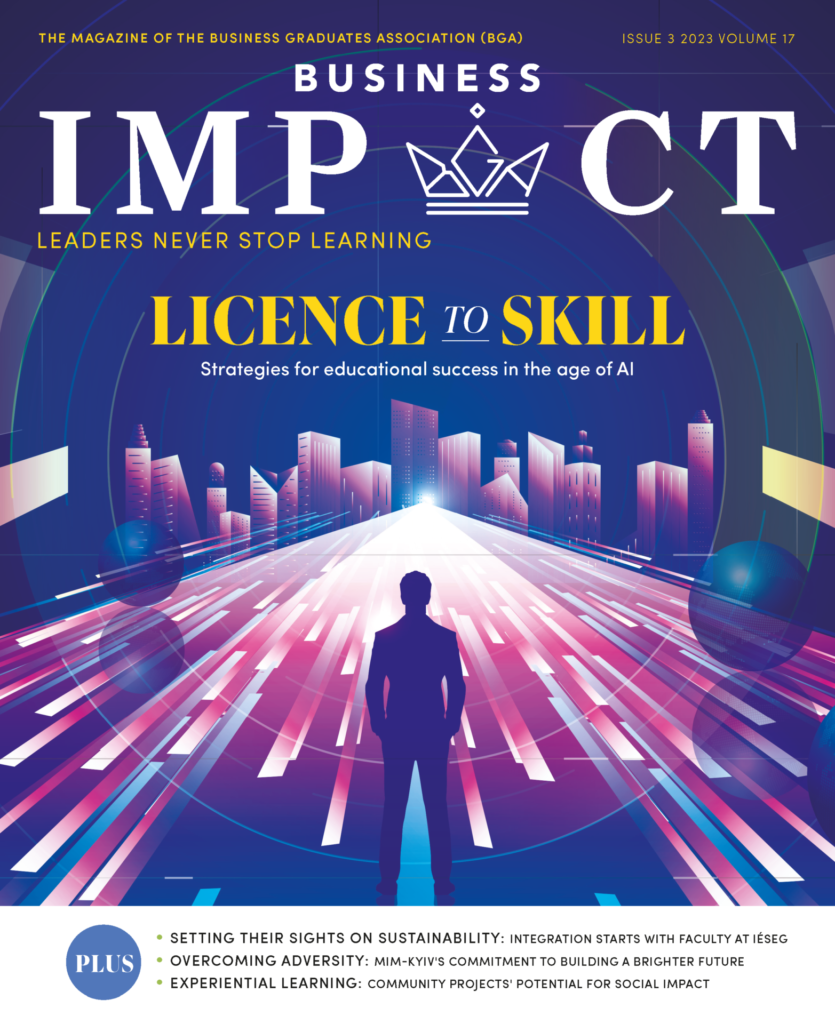Diving in: action learning with impact


Seeing and experiencing social impact first-hand, for example by watching disadvantaged children play on equipment you built for them five minutes earlier, is by far the biggest motivator for social change. Seeing is believing, but we know that doing something with your own hands for a common goal also has a profound effect on a person’s resolution to do good.
The multitude of challenges facing humanity and the natural world, such as climate change and geopolitical tensions, has undoubtedly affected the psyches of the younger generation and we have seen a shift in consciousness among those embarking on the first stage of their journey to becoming global business leaders. They care about the world around them and they want to be part of an educational establishment – and, ultimately, part of a business – that cares too.
Business schools at the vanguard of sustainable impact
“The existence of businesses helps the world go round,” remarks Stephanie Villemagne, chief operating officer for international development at Essca School of Management. “Businesses drive economic growth for the planet, so the question is: ‘How can we make sure that making money and business development are both sustainable and impactful?’ The answer starts with who is running these companies, so education and business schools are at the vanguard because we are working with the very people who will be running these companies in the future.”
The corporate sector used to be synonymous with financial return and business schools fed into that world. Social responsibility has now come to the fore and, in a competitive market for talent, business leaders can no longer ignore those outside their immediate orbit. Perhaps it has something to do with the fallout of 2008’s financial crash and the realisation that those in power must shoulder responsibility. What is certain is that more questions are circulating about who big business serves and interest in holding decision-makers to account is rising.
“Having a positive social impact is a vital element in projects and ventures for me and my peers,” says Sam Ferdinand, a business and international relations student at IE Business School. “Many of us agree that the best way to have a positive impact on society is by doing well ourselves and then channelling our resources for a social purpose.
“Business schools train many of tomorrow’s business leaders and must include education in sustainability and social impact as a mandatory part of their curricula if we wish to have a society with more socially responsible operations in the future. Their role is key.”
Deans at the world’s top business schools are listening to students such as Ferdinand and have acknowledged that their incoming cohorts want to combine ‘doing well’ and ‘doing good’. In addition, employers want to align themselves with institutions that are bringing about positive change beyond their campuses and, in recent years, we have witnessed the emergence of ranking systems with a focus on social impact. Simply put, the onus is on business schools to show that they are doing their bit for the planet, both in terms of social justice and sustainable development.
Incorporating community projects that deliver
As part of efforts to do good beyond their campuses, a number of leading European business schools, including Essca, IE Business School and Insead, have adopted learning and development assignments from Splash Projects. These bring students together to build facilities out of timber for charitable initiatives that would otherwise not be able to afford the infrastructure. As teams, they are able to contribute to bringing about lasting positive social change in their schools’ local communities and experience what it feels like to make someone else’s life better.
Some schools include these projects at the start of their programme to help inspire and motivate students beginning their learning journeys. It also gives new students the chance to bond over meaningful experiences. Other schools opt, instead, to place these projects at the culmination of their students’ learning journeys, giving graduates-in-waiting the opportunity to say “thank you” to their host countries.
While each business school may have specific learning objectives for community projects, the overriding reason to include them is to give students the chance to experience positive social impact. Current demand for such projects is unprecedented. Last September was Splash Projects’ busiest month to date, with 10 projects for eight charities, involving 1,650 participants in London, France and Spain.
The project with Essca alone involved 1,200 students across six campuses and impacted six charities. At the other end of the scale for size, the company’s work with Insead’s executive education programmes, which dates back more than 16 years, often involves no more than 20 participants who have a day, or less, to build something that will have a huge impact for years to come. Loïc Sadoulet, affiliate professor of economics at Insead, requests that projects incorporate a complex problem deliberately designed to thwart their delivery approach and help produce impactful learning outcomes for the teams.
“We have an obligation to give the future leaders of the world the chance to understand the responsibility they have in helping society be a better place and to set that social barometer,” notes Patti Brown-Varnier, executive director for academic affairs and programme delivery for MBA and executive MBA programmes at HEC Paris. “Business schools used to be about profit margins, finance, accounting and marketing – all of which can be learnt online,” Brown-Varnier explains, “but we’re seeing a shift towards what really matters – social responsibility and sustainable development.”
A recent project with HEC Paris in April involved 156 MBA students leaving their mark on the community they’d called home for 16 months in the form of a play area featuring a three-part shipwreck, seating areas and a chicken ‘hotel’. By building this at the Diapason Juvenile Behavioural Facility in central France, the cohort not only got to experience effective leadership and the power of teamwork, but also had the opportunity to give back to others less fortunate.
“The projects prompt the students to ask themselves the question ‘How can I do more?’” continues Brown‑Varnier. “There aren’t many of them not crying their eyes out at the end of a project because they’ve seen the impact they’ve had directly. They see what is needed to help others and want to be part of the solution. In the classroom, they’re not making an impact on anyone. The projects allow them to use what they’ve learnt and then leave a meaningful impact on others, so it completes the circle.”

Simon Poole is the managing director of Splash Projects, a company that has delivered learning programmes to more than 55,000 participants across the world since 2005
This article originally appeared in the print edition (Issue 3 2023) of Business Impact, magazine of the Business Graduates Association (BGA)


